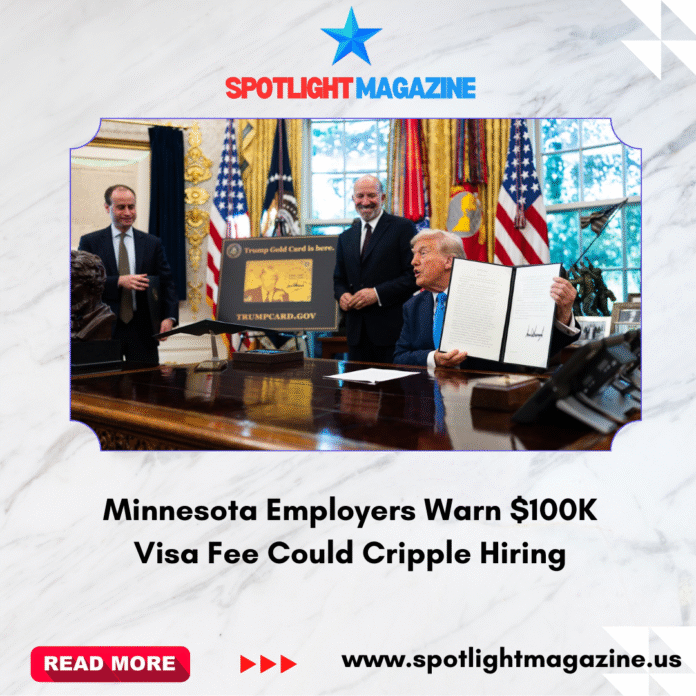Hiring managers across Minnesota say the state’s already tight labor pool could become even more strained following a new federal policy that drastically raises the cost of hiring highly skilled foreign workers.
On Friday, President Donald Trump signed an executive order raising the application fee for new H-1B visas from a few thousand dollars to $100,000. The H-1B program allows U.S. companies to employ foreign workers in specialized fields such as technology, medicine, and research. The new rule took effect Sunday morning and applies only to new applications, not renewals of existing visas.
Minnesota employers, from the Mayo Clinic and UnitedHealth Group to the University of Minnesota and 3M, rely heavily on the program to fill critical roles. More than 3,600 H-1B applications have already been approved this year for jobs in the state. With the new fee in place, however, the future supply of highly educated foreign workers may be in jeopardy.
The White House argued the change was necessary to boost domestic hiring and reduce what it calls abuse of the program. Officials said too many jobs in high-tech fields have gone to visa holders, pointing to data showing that foreign workers now make up 65% of IT jobs compared to 32% in 2003. They also noted that unemployment among recent computer science graduates is higher than in many other fields.
Critics say the policy goes too far. Twin Cities employment consultant Isaac Cheifetz described it as “monumental,” noting that nearly every Fortune 500 company uses H-1B workers and that avoiding them is almost impossible in a global economy.
Immigration attorneys reported a wave of panic among employers, with some rushing to bring foreign workers into the U.S. before the rule took effect. Minnetonka-based attorney Steven Thal said when he first heard about the fee, he wondered if it was even real. He compared the policy to a “bunker-buster bomb” that could destroy the visa system, predicting that very few companies would be able or willing to pay the new costs.
The impact could be felt across industries in Minnesota. Large employers like Medtronic, Target, and Best Buy, as well as smaller companies such as Red Wing Shoes, have all used H-1B visas in recent years. Even sectors not typically associated with tech, such as banking and logistics, depend on these workers. At Ecolab, only 61 of its 19,000 U.S. employees are on H-1Bs, but the company could struggle to fill certain roles without access to global talent.
Some business leaders say the change could disrupt innovation. Alex Danzberger, CEO of Aprios Custom Manufacturing in Brooklyn Park, said while his company does not currently use H-1B workers, he has seen the benefits in past workplaces. “In good conscience, I couldn’t do that,” he said of paying the fee. “I’d just have to take the time to find somebody who’s already here.”
Legal experts expect the policy to face court challenges, given the extreme jump in fees compared to past practice. Michael Davis, a Minneapolis attorney, said the move could effectively end the visa program unless overturned. He noted that his office received a flood of messages from concerned companies and individuals as soon as the news broke.
The Trump administration has made reshaping the U.S. labor force a priority, arguing that too many industries—from farming to Silicon Valley—have come to rely on foreign workers. Alongside the H-1B change, Trump also announced a new “Trump Gold Card” for foreigners seeking permanent U.S. residency, with a fee set at $1 million.
For Minnesota businesses, the long-term consequences could be significant. The state’s workforce has already shrunk by nearly 30,000 people since 2010, and many employers say there simply are not enough local candidates to meet demand. As former health care executive Cris Ross put it, “Everyone would like to hire someone local. But the world is running on tech, and even though American universities are doing a solid job, there’s more demand than there are people with the necessary skills.


